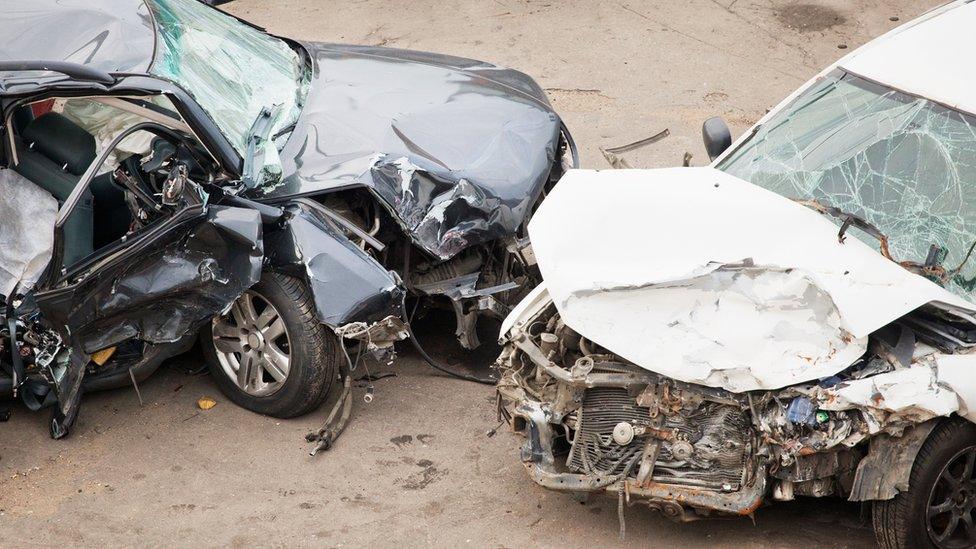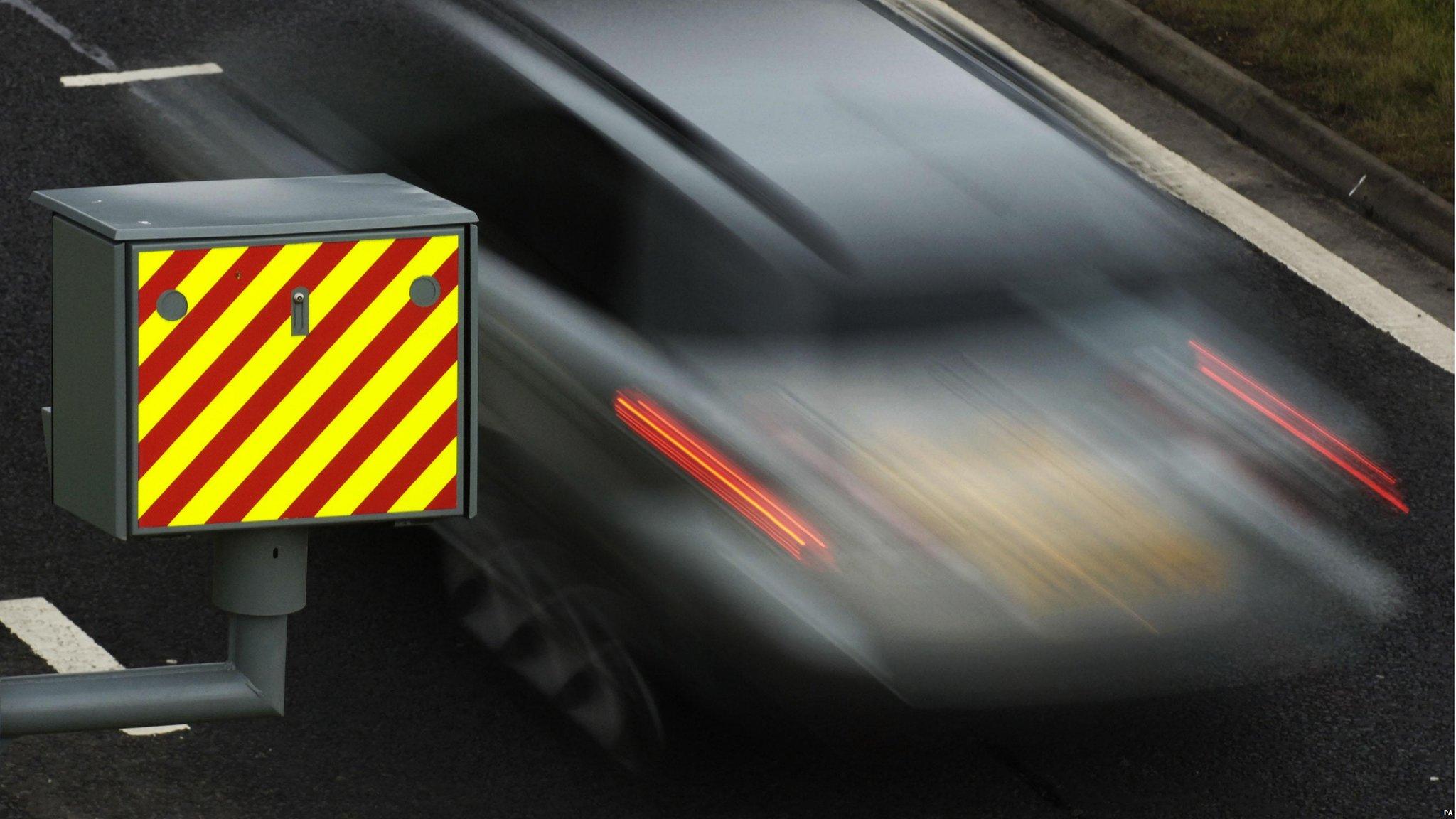Do driver awareness courses make roads safer?
- Published

Driver awareness courses are designed to reduce the risk of road traffic accidents
Early on a Saturday morning I found myself in the basement of a hotel in the company of 12 strangers.
The air conditioning was on at full blast; the atmosphere between us was also rather chilly.
This was our "sentence" for committing a minor motoring offence - and none of us wanted to be there.
We were on a driver awareness course called What's Driving Us?
It was that, or accept a £100 fine and three penalty points. No contest, really.
Over the next three hours there were discussions, presentations and role-play.
None of us embraced it with any great enthusiasm - we just wanted to "tick the box" and let the weekend begin.
My crime?
I had jumped a red light driving up the A10 in north London and was spotted by a CCTV camera.
The road ahead of me had been clear - but there was no excuse for what I had done and no point challenging the evidence.
A handful on the course had committed a red light offence like me, another group had been caught with a mobile phone, one man had driven too close to another car and a couple of others had ignored road signs.
Wasted opportunity
At the start of the session, as we confessed our sins, it felt as though the punishment was a good fit for the crime: the course cost marginally less than the fine but with travel costs added was probably about the same, and we would spend some time getting useful motoring tips with warnings about bad driving ringing in our ears.
Now, after it's all over, I see it as a wasted opportunity. It was all rather tepid.
Whereas our two instructors had the right mix of authority, knowledge and humour, the course materials were unimaginative and unconvincing.

Speed cameras are designed to improve road safety
Why weren't we shown footage of the effects of driving through red lights, using a mobile and ignoring road signs? Couldn't we have heard from the victim of a car crash about the impact on them? Where was the account of a motoring offender who had learned the error of their ways?
It was a chance to ram home the ramifications of careless driving and it was missed.
What did I learn instead? Don't get caught.
Now, when the traffic light turns from green to orange I'm more likely to apply the brakes than keep my foot on the gas.
Perhaps that's not a bad lesson to learn - but it's not what it should be, and I can't guarantee it'll have a lasting effect.
That driver awareness seminar should have stuck in my memory like the image of a blackened lung tissue from the anti-smoking session I went to at school some 35 years ago.
My fellow motorists on the driving course may have felt differently, but I didn't sense it had been a driving-altering experience for them either as they rushed out of that windowless meeting room at the end of the morning.
Lack of evidence
In fact, more widely, there appears to be a dearth of reliable evidence about the impact of driver awareness and speed reduction programmes.
Over the past decade, they have grown to become a major component of the regime for dealing with motoring offences since they were launched as an alternative to prosecution in 2006.
The vast majority of courses across the UK are overseen on behalf of the police by the National Driver Offender Retraining Scheme (NDORS): 1.4 million people attended courses last year - treble the number in 2010, and far greater than the overall number of prosecutions for motoring offences (591,000 in England and Wales in 2014).
Most of those who went on courses, 1.2 million, took part in speed awareness training. More than 123,000 people attended the course that I completed - in 2011 it didn't even exist.
NDORS says the schemes it runs are designed by a group of police officers, behavioural change psychologists, transport academics and road safety experts. It says they are based on the latest research, have been evaluated and are "fit for purpose". But I was uncertain about the evidence on its website.
The biggest study it cites, published by the Department for Transport in 2005, external, compared those who had attended courses with those who hadn't. It involved a questionnaire and an on-road assessment by a driving instructor six and 12 months later.
The study suggested there had been a "modest improvement towards safe driving" but said it did not find "reliable evidence that this translates into improved driving performance on the road". The longer-term effects of the courses weren't measured.
A more recent evaluation, conducted in 2011 for ACPO, external, which was then the chief police officers' association, indicated there were "positive changes in attitudes" among motorists who had been on a speed awareness course.
Yet, the research relied on comparing attendees' attitudes to driving before, immediately after the course and three months later. The response rate at the three-month point was only 31%.
NDORS claims it has received "many accolades" for its courses. In 2012 it won the Prince Michael International Road Safety premier award.
The organisation says: "We are not naive enough to think that the courses will stop all negative driving behaviour for all attendees, so our desired outcome is to try and re-educate as many as possible."
It boasts that an impressive "98% of first-time offenders do not reoffend over a five-year period".
However, it's not clear where those figures come from - and there is no control group, of drivers who received different sanctions for the same misdemeanours, to make the data meaningful.
Most effective penalty
Even NDORS acknowledges it doesn't know how the courses compare with the effect of receiving penalty points, as most first-time offenders who take part in driver or speed awareness schemes would otherwise have had three points added to their licence.
The Transport Research Laboratory, which says it provides "independent and impartial world-class research, consultancy, testing and certification for all aspects of transport", pointed me towards a major project carried out last year for Thames Valley Police and the Hampshire Constabulary into the effectiveness of a range of roads policing strategies.
At 175 pages, it is certainly the most comprehensive study I have come across, yet it identified "a number of gaps in the evidence", saying the impact of the National Speed Awareness Course is "broadly unknown" in terms of its effect on repeat speed offences and future collisions.
In fact, the project found that the impact for "most forms of penalty" was not known.

Increasing the level of fine for using a mobile phone is currently under consideration
As for using mobile phones while driving, for which the government is consulting on raising the fine from £100 to £150 and the penalty points from three to four for non-HGV drivers, there is even less information about what works.
The Department for Transport (DfT) says in its consultation document that the "primary objective" of the proposed changes is to "encourage first-time offenders to opt for remedial training courses where they are offered as an alternative" to points and a fine.
Given that mobile phone use is seen as a growing problem, with some 29,700 fixed penalty notices in England and Wales in 2014, it seems surprising that legal reforms are being contemplated without firm evidence that the courses they want people to take act as a deterrent.
Indeed, officials appear to accept that there needs to be an improvement in the evidence base supporting the overall use of motoring courses.
A DfT spokesperson says although Britain has some of the "safest roads in the world" it can "always do more".
"An evaluation of speed awareness courses is being carried out for us and the Road Safety Trust, and will be published in due course," the spokesperson says.
As part of the study, Ipsos Mori will examine the impact of schemes on reoffending and reconviction rates, as well as collisions.
While the Ministry of Justice compiles exhaustive data on reoffending rates after community sentences and imprisonment for all types of offences, a comprehensive review of the impact of motoring courses is certainly long overdue.
In the meantime, I'll do my best to ensure that I wait till the light goes green and never again have to spend a Saturday morning facing up to my bad driving habits.
- Published11 January 2016

- Published19 April 2015
